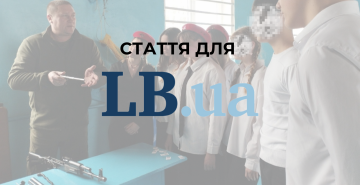

Patriotic education of Ukraine and the Russian Federation: what is the difference


Anastasiia Vorobyova, the analyst
During the new phase of the Russian-Ukrainian war, the issue of the so-called “patriotic education”, which the Russian Federation is currently actively implementing in the temporarily occupied territories of Zaporizhzhia and Kherson region and the so-called “DPR” and “LPR”, became particularly relevant. Although the Ukrainian human rights community emphasized the problems of the militarization of education and the introduction of Russian programs on patriotic education since the beginning of the occupation of Crimea in 2014, Russian propaganda actively tried to level out these problems, using for this purpose manipulative and absolutely groundless accusations of training Ukrainian children in “Neo-Nazi camps” and the alleged cultivation of the “Ukrainian Nazism” within the school curriculum, and “hatered to everything Russian”. To do this, Russian propagandistic resources on the international platforms talk about the “horrors” of the patriotic education in Ukraine and use it as an argument for the impossibility of criticizing the Russian programs implemented in the Russian federation and in the occupied territories regarding Ukrainian children.
Unfortunately, these propagandistic narratives appeared during the Russian-Ukrainian war of 2014-2022, when, even quite respectable foreign media outlets published long materials about how Ukraine allegedly fosters “Nazis” from its children. Similar accusations were heard even at the highest level – for example, at the UN Security Council, Russian Propagandists talked about the “Russophobic” nature of Ukrainian education.
In this article, Anastasiia Vorobyova, the analyst of the Public Organization “Center for Civic Education “Almenda”, offers to understand, why any comparisons of patriotic education in Ukraine and in the Russia-occupied territories are inappropriate and manipulative, and in order to prove this thesis, it is not even necessary to delve into the content of the programs themselves.
1. The actions of the occupier state in the occupied territories and the national state within its own territory are different legal regimes and, therefore, have a different nature of obligations.
Any comparison of the Russian Federation and Ukraine in this context is irrelevant due to the fact that situations with patriotic education in the Russian Federation and in Ukraine operate in completely different legal regimes. The laws of Ukraine operate exclusively within its own territory, and Ukraine has no intention of implementing the principles of its patriotic education in the territory of any other states. Instead, the Russian Federation purposefully and systematically implements its own laws and regulations in the territories of other sovereign states, including the occupied Ukrainian territories (Autonomous Republic of Crimea and the city of Sevastopol, parts of Zaporizhzhia, Kherson, Luhansk and Donetsk regions). A detailed analysis of the illegality of given practices in the context of education can be read in the material by the CCE “Almenda”, but the main thing in this context is that the regime of occupation provides very clear restrictions for the occupier state regarding changes to the current regulations in the occupied territories, which must be minimalized and relate only to the interests of maintaining order. The occupier state is a temporary administrator of the occupied territories, therefore the very fact of the implementation of Russian programs on patriotic education is a violation of the norms of international humanitarian law regarding the inhabitants of these territories. Therefore, in the conditions of the current war, the comparison of the Ukrainian internal legislation and the legislation of the Russian Federation which has no place in the territory of Ukraine at all, does not make any sense or logic.
2. The purpose of military-patriotic education in national territories and in the occupied territories is fundamentally different.
In Ukraine, one of the components of the system of national-patriotic education is military-patriotic education, which is a purposeful, organized process of forming the readiness of high school-aged youth for compulsory military service in the Armed Forces of Ukraine, the content of which is determined by the Constitution and the Laws of Ukraine, the military Oath and military statutes.
Russian military-patriotic education, in contrast, is considered as “multifaceted, systematic, purposeful and coordinated activity of state bodies, public associations and organizations regarding the formation of youth’s high patriotic consciousness, exalted feeling of loyalty to their Fatherland, readiness to fulfill their civic duty, their most important constitutional duties on defending the interests of the Fatherland”.
Military-patriotic education in the Russian Federation is also provided for within the framework of the Law “On Military Duty and Military Service” as a systematic activity of the authorities of the Russian Federation, which receives funding from the federal and local budgets.
In fact, at least two resolutions of the UN General Assembly emphasized the problem of using education in Crimea for the indoctrination of children in the context of joining the armed forces of the Russian Federation, including through the creation of educational institutions that provide military training for the service in the Russian armed forces; the introduction of combat training courses in Crimean schools and the official inclusion of Crimean educational institutions in the “military-patriotic” educational system of the Russian Federation. The illegal practices of the Russian Federation regarding the militarization and indoctrination of Ukrainian children in the occupied territories were documented by the human rights community during the entire period of the Russian-Ukrainian war since 2014 – therefore it can be argued about the systematic and purposeful nature of the militarization policy of the Russian federation in relation to the residents of the occupied Ukrainian territories.
The Ukrainian human rights community has repeatedly emphasized that what is illegal is not the fact of the existence of patriotic education programs in the Russian Federation and their implementation within the internationally recognized borders of the Russian Federation, but the fact that these programs are being implemented in the occupied Ukrainian territories (which, as it was already defined above, in itself constitutes a violation of the international humanitarian law).
Furthermore, the Russian programs on patriotic education, which are currently arbitrarily implemented in the occupied Ukrainian territories, have a clear objective of forming the Russian civic identity, introducing Russian traditional values and motivation to serve in the armed forces of the Russian Federation. According to the provisions of the international humanitarian law, children in the occupied territories have the right to preserve their own identity and should not be subjected to propaganda regarding voluntary joining the ranks of the army of the occupier country, let alone they are not obliged to serve in the armed forces of the occupier state upon reaching adulthood. The implementation of patriotic education according to the standards of the Russian Federation may lead to the fact, that Ukrainian children will perceive service in the Russian army as a part of their own civic duty, which in fact is not the case.
It can be argued that the Russian Federation de-facto uses educational system in the occupied territories to create a basis for the further recruitment of children into the armed forces of the Russian Federation. This, and the introduction of mandatory educational programs on basic military training, and training in handling weapons, and the participation in military-patriotic games and camps, which openly glorify Russian militarism. Such actions once again testify to the increase in pace of training children to participate in real hostilities, and also, militarization of children’s minds will become a major obstacle in the process of re-integration of the population after the de-occupation of Ukrainian lands (the aspects of the crime of child recruitment are detailed in the analytical review “Violations 6+” by CCE “Almenda”).
Although, some researchers have already raised questions regarding the illegality of such practices in the context of international human rights law regarding Russian children in the territory of the Russian Federation, such practices are absolutely unacceptable in the context of the occupation of Ukrainian territories – especially considering the purpose of such education.
Conclusion
In the realities of the full-scale war of the Russian Federation against Ukraine, which, since 2014, has been generously seasoned with Russian propaganda and active disinformation, is becomes increasingly difficult to confront such challenges. Using its quite powerful resources, Russia effectively manipulates the facts and distorts the reality, trying to whitewash its illegal practices in the eyes of international community. However, considering the given legal arguments, we can conclude that any attempts to lump together patriotic education, which takes place within internationally recognized borders of Ukraine and in the territories occupied by Russia, are wrong for the following reasons.
First of all, such attempts are play into Russian propaganda, which has repeatedly tried to “sculpt” the image of “Nazi state” out of Ukraine, whose two million citizens should be “denazified”, by means of re-education or physical extermination, including children.
Secondly, turning to the argument like “Ukraine also has patriotic education, therefore it a priori cannot criticize the actions of the Russian federation” is manipulation and an attempt to blur the responsibility of the Russian Federation for the illegal practices in the occupied territories. The issues of the patriotic education programs, which are implemented by the Ukrainian government in its own territory, should be considered within the framework of the established international legal procedures, and not become the argument in the information war of the Russian Federation against Ukraine. Moreover, the issue of patriotic education in Ukraine should be considered through the prism of Ukrainian obligations under the international law in its own territories; and the issue of patriotic education implemented by the Russian Federation – through International Humanitarian Law and International Human Rights Law, because the occupied territories remain the territories of Ukraine, where Russian laws, including patriotic education programs, have no place.
The article was prepared by the Centre of civil education “Almenda” as a part of the project “Steps towards the meeting: bringing youth from temporarily occupied territories closer to reintegration”. The project is implemented with the financial support of the Ministry of Foreign Affairs of the Czech Republic as a part of the Transition Promotion Program. The views represented in this material belong to the authors and do not reflect the official position of the Ministry of Foreign Affairs of the Czech Republic.



